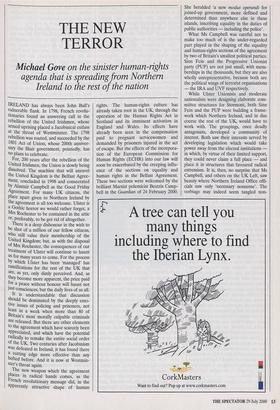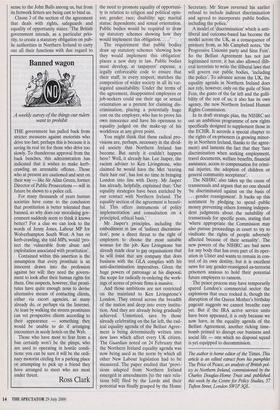THE NEW TERROR
Michael Gove on the sinister human-rights
agenda that is spreading from Northern Ireland to the rest of the nation
IRELAND has always been John Bull's vulnerable flank. In 1798, French revolu- tionaries found an answering call in the rebellion of the United Irishmen, whose armed uprising placed a Jacobinical cutlass at the throat of Westminster. The 1798 rebellion was routed, and succeeded by the 1801 Act of Union, whose 200th anniver- sary the Blair government, pointedly, has no plans to celebrate.
For, 200 years after the rebellion of the United Irishmen, the Union is slowly being dissolved. The machine that will unravel the United Kingdom is the Belfast Agree- ment, concluded in 1998 and consecrated by Alastair Campbell as the Good Friday Agreement. For many UK citizens, the place apart given to Northern Ireland by the agreement is all too welcome. Ulster is a Gothic horror we would rather forget, a Mrs Rochester to be contained in the attic or, preferably, to be got rid of altogether. There is a deep dishonour in the wish to be shot of a million of our fellow citizens, who still value their membership of the United Kingdom; but, as with the disposal of Mrs Rochester, the consequences of our treatment of Ulster will continue to haunt us for many years to come. For the process by which Ulster has been 'managed' has ramifications for the rest of the UK that are, as yet, only dimly perceived. And, as they become more apparent, the price paid for a peace without honour will haunt not just consciences, but the daily lives of us all. It is understandable that discussion should be dominated by the deeply emo- tive issues of policing and prisoners, not least in a week when more than 80 of Britain's most morally culpable criminals are released. But there are other elements to the agreement which have scarcely been appreciated, and which have the potential radically to remake the entire social order of the UK. Two centuries after Jacobinism was defeated in Ireland, it has found there a cutting edge more effective than any hefted before. And it is now at Westmin- ster's throat again. The new weapon which the agreement places in radical hands comes, as the French revolutionary message did, in the apparently attractive shape of human rights. The human-rights culture has already taken root in the UK, through the operation of the Human Rights Act in Scotland and its imminent activation in England and Wales. Its effects have already been seen in the compensation paid to pregnant servicewomen and demanded by prisoners injured in the act of escape. But the effects of the incorpora- tion of the European Commission for Human Rights (ECHR) into our law will soon be exacerbated by the creeping influ- ence of the sections on equality and human rights in the Belfast Agreement. These two sections were welcomed by the brilliant Marxist polemicist Beatrix Camp- bell in the Guardian of 24 February 2000. She heralded 'a new modus operandi for joined-up government, more defined and determined than anywhere else in these islands, inscribing equality in the duties of public authorities — including the police'.
What Ms Campbell was careful not to make too much of is the under-regarded part played in the shaping of the equality and human-rights sections of the agreement by two of Britain's smallest political parties. Sinn Fein and the Progressive Unionist party (PUP) are not just small, with mem- berships in the thousands, but they are also wholly unrepresentative, because both are the political wings of terrorist organisations — the IRA and UVF respectively.
While Ulster Unionists and moderate nationalists were designing elaborate com- mittee structures for Stormont, both Shin Fein and the PUP were building a frame- work which Northern Ireland, and in due course the rest of the UK, would have to work with. The groupings, once deadly antagonists, developed a community of interest. Both saw their interests served by developing legislation which would take power away from the elected institutions in which, by virtue of their limited support, they could never claim a full place — and place it in structures that favoured radical extremism. It is, then, no surprise that Ms Campbell, and others on the UK Left, saw beauty where Northern Ireland Office offi- cials saw only 'necessary nonsense'. The verbiage may indeed seem tangled non- sense to the John Bulls among us, but from its fretwork fetters are being cast to bind us.
Clause 3 of the section of the agreement that deals with rights, safeguards and equality of opportunity states: 'The British government intends, as a particular prio- rity, to create a statutory obligation on pub- lic authorities in Northern Ireland to carry out all their functions with due regard to the need to promote equality of opportuni- ty in relation to religion and political opin- ion; gender; race; disability; age; marital status; dependents; and sexual orientation. Public bodies would be required to draw up statutory schemes showing how they would implement this obligation. . . . '
The requirement that public bodies draw up statutory schemes 'showing how they would implement this obligation' places a new duty in law. Public bodies must develop, at taxpayers' expense, a legally enforceable code to ensure that their staff, in every respect, matches the composition of wider society in all its var- iegated unsuitability. Under the terms of the agreement, disappointed employees or job-seekers could use their age or sexual orientation as a pretext for claiming dis- crimination, placing a potentially huge cost on the employer, who has to prove his own innocence and have his openness to equality judged on the make-up of his workforce at any given point.
You might think that these radical pro- visions are, perhaps, necessary in the divid- ed society that Northern Ireland has become. But surely it couldn't happen here? Well, it already has. Lee Jasper, the racism adviser to Ken Livingstone, who claimed he would have the Met 'tearing their hair out', has lost no time in bringing London into line with Derry. Mr Jasper has already, helpfully, explained that: 'Our equality strategies have been enriched by our contact with Northern Ireland. The equality section of the agreement is beauti- ful. This offers instruments of policy implementation and consultation on a principled, ethical basis.'
Mr Jasper's principles, including the embodiment in law of 'indirect discrimina- tion', pose a direct threat to the right of employers to choose the most suitable woman for the job. Ken Livingstone has already made clear to gay organisations that he will insist that any company that does business with the GLA complies with his anti-discrimination imperatives. Given the huge powers of patronage at his disposal, the scope for radically re-ordering the work- ings of scores of private firms is massive.
And those ambitions are not restricted on the mainland to Ken Livingstone's London. They extend across the breadth of the nation and deep into every institu- tion. And they are already being gradually achieved. Unnoticed, save by those already celebrating on the far left, the rad- ical equality agenda of the Belfast Agree- ment is being determinedly written into new laws which affect every UK citizen. The Guardian noted on 24 February that the Northern Ireland equality agenda was now being used as the norm by which all other New Labour legislation had to be measured. The paper exulted that 'provi- sions adapted from Northern Ireland emerged in amendments [to the race rela- tions bill] filed by the Lords and their potential was finally grasped by the Home Secretary. Mr Straw reversed his earlier refusal to include indirect discrimination and agreed to incorporate public bodies, including the police.'
A model of 'discrimination' which is anti- liberal and outcome-based has become the model across the UK, as a consequence of pressure from, as Ms Campbell notes, 'the Progressive Unionist party and Sinn Fein'. So the Belfast Agreement has not just legitimised terror, it has also allowed illib- eral terrorists to write the illiberal laws that will govern our public bodies, 'including the police'. To advance across the UK, the equality agenda in Northern Ireland does not rely, however, only on the guile of Sinn Fein, the gusto of the far left and the gulli- bility of the rest of us; it also has its own agency, the new Northern Ireland Human Rights Commission.
In its draft strategic plan, the NIHRC set out an ambitious programme of new rights specifically designed to supplement those in the ECHR. It accords a special chapter to the rights of ex-prisoners (a growing minor- ity in Northern Ireland, thanks to the agree- ment) and laments the fact that they 'face discrimination when seeking employment, travel documents, welfare benefits, financial assistance, access to compensation for crimi- nal injuries, the adoption of children or general community acceptance'.
The NIHRC also takes up the cause of transsexuals and argues that no one should `be discriminated against on the basis of . . . gender reassignment'. It backs up this sentiment by pledging to spend public money preventing others forming indepen- dent judgments about the suitability of transsexuals for specific posts, stating that `where appropriate the Commission may also pursue proceedings in court to try to vindicate the rights of people adversely affected because of their sexuality'. The new powers of the NIHRC are bad news for any body that has even part of its oper- ation in Ulster and wants to remain in con- trol of its own destiny, but it is excellent news for any gender-reassigned ex-terrorist prisoners anxious to hold their potential future employers to ransom.
The peace process may have temporarily spared London's commercial sector the explosions that once rocked it, though the disruption of the Queen Mother's birthday pageant suggests we cannot breathe easy yet. But if the IRA active service units have been appeased, it is only because we now have, in the equality agenda of the Belfast Agreement, another ticking time- bomb primed to disrupt our business and social life — one which no disposal squad is yet equipped to decommission.
The author is home editor of the Times. This article is an edited extract from his pamphlet The Price of Peace, an analysis of British pol- icy in Northern Ireland, commissioned by the Charles Douglas-Home Trust and published this week by the Centre for Policy Studies, 57 Tufton Street, London SW1P 3QL



























































 Previous page
Previous page